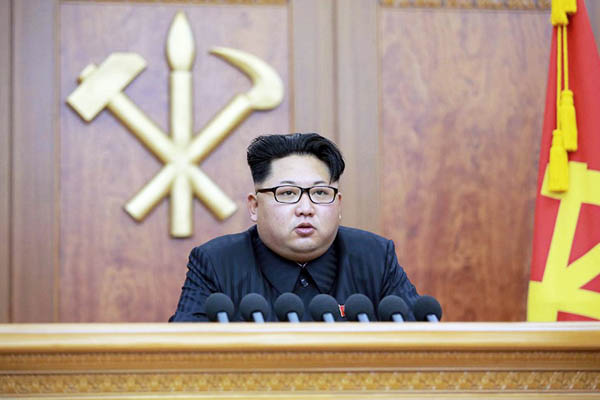
KNS-KCNA—AFP
North Korean leader’s speech follows U.S. secretary of state announcing willingness to talk without preconditions
North Korean leader Kim Jong-Un vowed to “win victory in the showdown” against the U.S. with his rapidly advancing nuclear arsenal, state media said on Wednesday, after the country’s latest missile test heightened global tensions.
The nuclear-armed North has rattled the international community with a flurry of nuclear blasts and missile launches, most recently on Nov. 29 when it test-fired its longest-range intercontinental ballistic missile (ICBM), capable of reaching all major U.S. cities.
Kim told workers behind the latest test that his country would “victoriously advance and leap as the strongest nuclear power and military power in the world” at a conference on Tuesday, according to state news agency KCNA. “The… national defense industry will continue to develop and we will win victory in the showdown with the imperialists and the U.S.,” he was indirectly quoted as saying.
The country’s nuclear force had been completed in a “death-defying struggle” and despite a high cost, he added.
Kim’s comments come as global powers scramble for a response to the crisis, with the U.S. backing stringent economic and diplomatic sanctions on Kim’s regime to halt its nuclear drive. But the North has continued to lob missiles, posing a major challenge to U.S. President Donald Trump.
Fears of a catastrophic conflict with the nuclear-armed regime have spiked as the leaders have taunted each other, with Trump dubbing his rival “Little Rocket Man.”
Tension flared anew in the flashpoint peninsula after the Nov. 29 launch of the Hwasong-15 ICBM, which the North claimed could deliver a “super-large heavy warhead” anywhere on the U.S. mainland. Many analysts suggest that the rocket is capable of reaching the U.S. mainland but voice skepticism that Pyongyang has mastered the advanced technology needed to allow the rocket to survive re-entry to the Earth’s atmosphere.
Last month’s launch was the first test of any kind since Sept. 15, and quashed hopes that the North may have held back in order to open the door to a negotiated solution to the nuclear standoff. But U.S. Secretary of State Rex Tillerson said for the first time that Washington was willing to talk to Pyongyang “without preconditions.”
The U.S. has long insisted that the North should take concrete steps towards disarming before any negotiations, which should lead to complete, irreversible and verifiable denuclearization. “It’s not realistic to say we’re only going to talk if you come to the table ready to give up your program,” Tillerson told a meeting of the Atlantic Council policy forum. “They have too much invested in it.”
But he also warned that the U.S. military stands ready to act if necessary.
The latest military standoff prompted concerns of another full-scale conflict in the region after the 1950-53 Korean War that left much of the peninsula in ruins.
Even if a second war remained conventional, tens of thousands of South Koreans—as well as many of the 28,500 U.S. troops stationed in the country—are expected to be killed just in the first days of fighting, analysts say.
